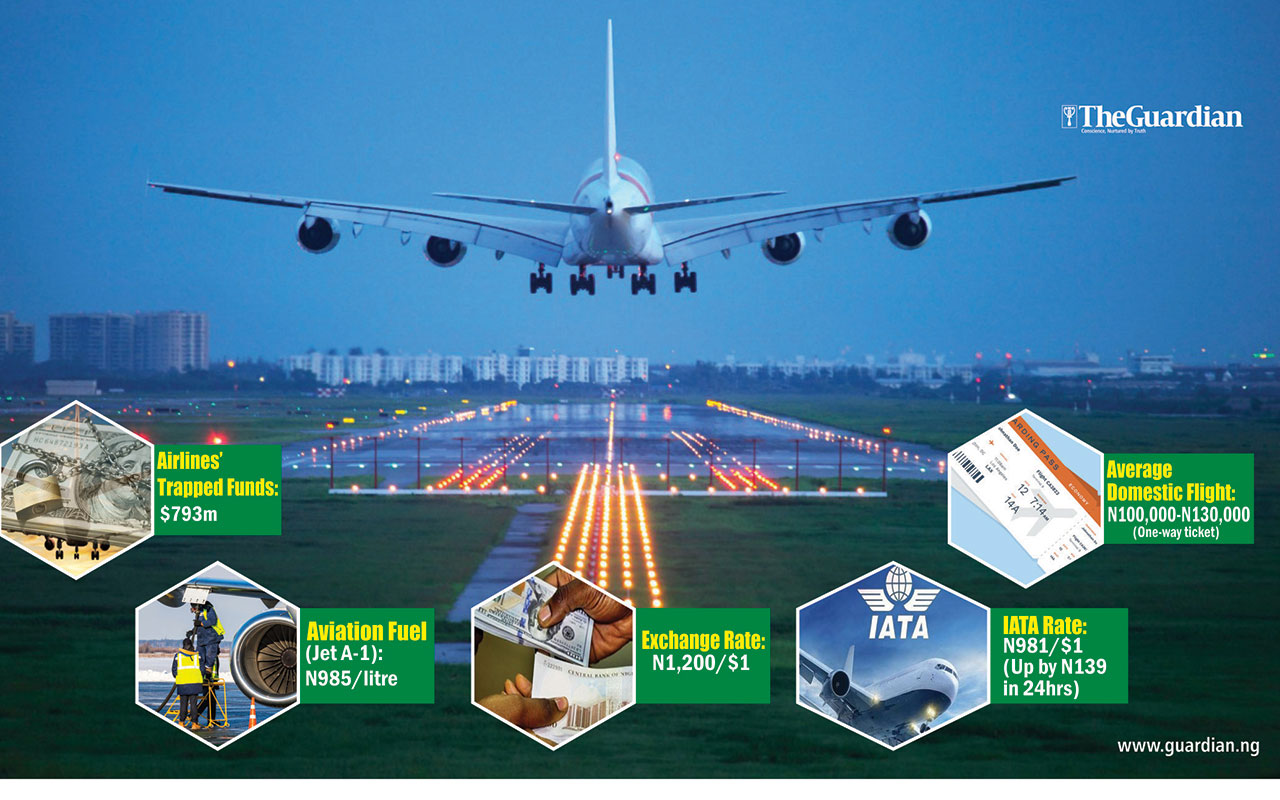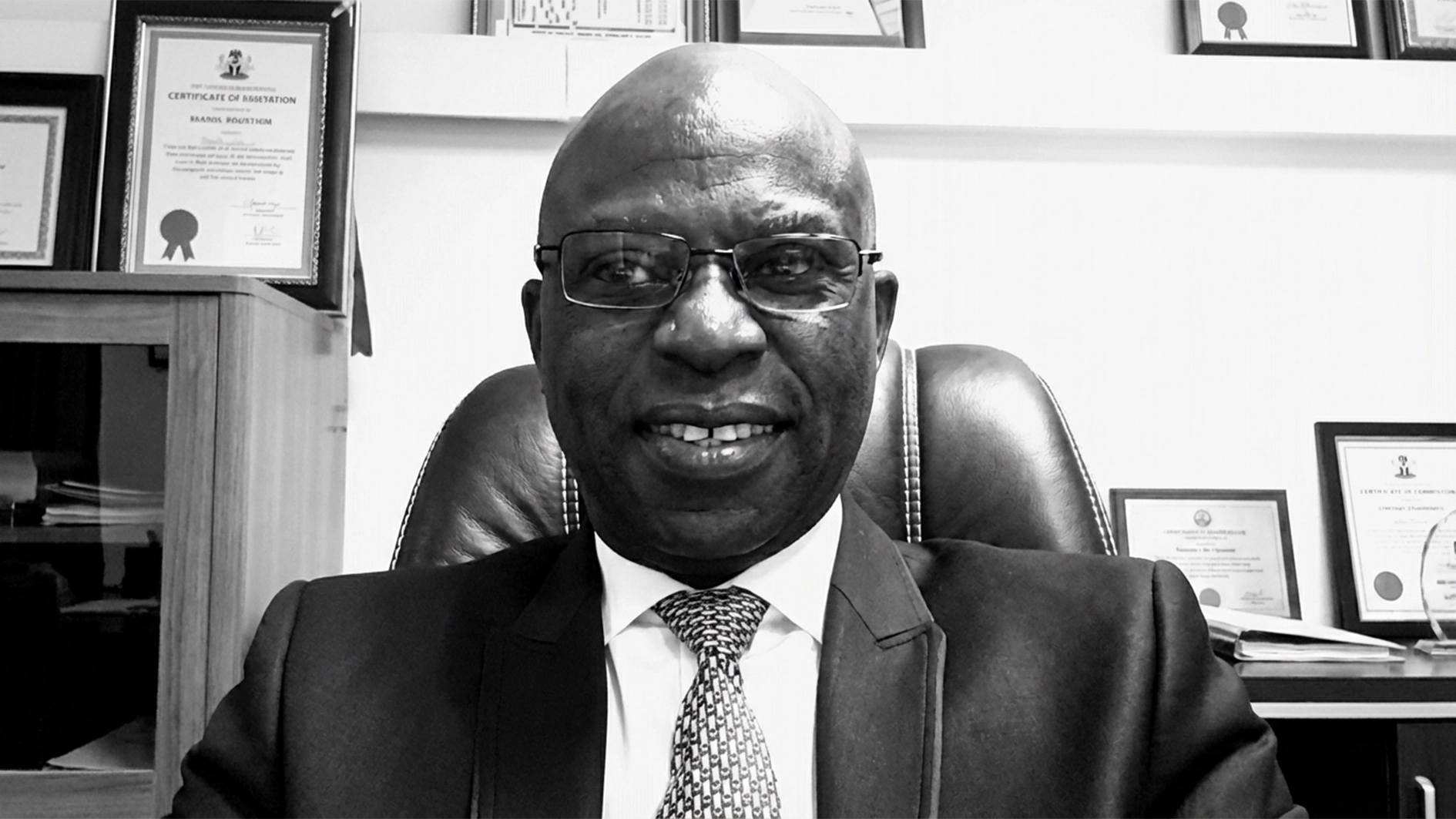 • Domestic carriers’ N100,000 per one-way trip may increase to N130,000
• Domestic carriers’ N100,000 per one-way trip may increase to N130,000
• Confusion in downstream as IATA Rate of Exchange surges by N139 in 24 hours
• Foreign airlines bemoan $793m trapped funds, $300m legacy debt, illiquidity on I&E window
• Aviation will not survive without clear line of FX support for operators, IATA warns
Steady free-fall of the naira value to dollar has registered new odd records in the air transport sector, with aviation fuel now almost N1000/litre and operators cum travel agencies in a pricing dilemma.
Across both local and international segments of the sector, the rate of N1200/$1 in the open market and almost 400 per cent surge in price of aviation fuel are threatening to double already high airfares – and further shrink the air travel market.
On the domestic front, findings showed that the average fare of N75,000 for one-hour (one-way) flight has increased to N100,000, and may peak towards N130,000-plus soon, to cover cost of operations only.
Foreign airlines operating on Nigerian routes have also adjusted their airfares and much to the confusion of travel agencies. At the weekend, the IATA Rate of Exchange (IRoE) soared by N139, shifting from N842 to N981/$1 in one leap.
While the International Air Transport Association (IATA) reiterated not increasing airfares, it however, bemoaned the complicated foreign exchange liquidity crisis that has kept foreign airlines’ $793 million trapped in Nigeria (as of August 2023 entry). Of the sum, $300 million is legacy debt which the Central Bank of Nigeria (CBN) has taken but yet to remit to IATA on behalf of the airlines.
IATA told The Guardian that while the FX liquidity crisis is not peculiar to the air transport sector, the Federal Government has no alternative than to avail a clear line of FX support to urgently save local airlines, and in turn, the economy from the slippery slope.
Aviation fuel, also known as Jet A1, accounts for between 30 to 40 per cent of operational costs in aviation. Being a deregulated product that is exclusively controlled by suppliers, the price has consistently been fluctuating along with the naira to dollar exchange rate.
Findings at the weekend showed that aviation fuel has increased from N800 to almost N1000/litre, subject to location.
Checks showed that Lagos Airport has the lowest rate of N935/litre. Average pump price at Abuja airport was pegged at N975/litre. Port Harcourt sold for N970, while Kano was N985. Upper north sold for an average of N1000, subject to availability.
Apparently in sync with the dire realities, airlines like Air Peace, United Nigeria, ValueJet, and Arik Air have already aligned average pricing from N75,000 to N100,000-plus benchmark – “a paltry increment compared with massive surge in price of fuel and other components”, an operator said.
Chairman of United Nigeria Airlines (UNA), Prof. Okonkwo Obiora, said all airline operators deserve special commendations for not passing the entire cost of operation to consumers, and for their resilience that has kept the wobbly economy going despite all odds.
Recall that UNA started operations in February 2021 with a business model set on parameters of N190/litre fuel and N365/$1 exchange rate. By April, fuel rose to N250 in Lagos, and had reached N340/litre by December.
On UNA’s first anniversary in February 2022, fuel was already N400/litre (over 100 per cent spike in a year). Despite government’s intervention pledges, Jet A1 climbed to N600/litre in May 2022 (200 per cent increase).
Just before its second anniversary last February, fuel price oscillated around N800/litre (300 per cent increase), and now in the neighbourhood of N1000/litre (being 400 per cent spike from UNA’s original business model).
Okonkwo, who also doubles as the spokesperson of the Airlines Operators of Nigeria (AON), noted that domestic airfares did not tag along with fuel price, FX and other cost of operations, just for affordability of the public.
He said: “We are subsidising the cost of seats per flight. So, if you see fare increases now, please understand. They may still be higher because we are actually not covering the cost of operations. The little adjustment is to serve the public better. It is better to fly safe, be viable and remain in business than just flying cheap and risk collapse,” Okonkwo said.
Managing Director of Aero Contractors, Capt. Ado Sanusi, added that there is very little the operators could have done differently than to raise airfares in the face of naira-free fall.
Sanusi reiterated that almost everything, except the tickets, is denominated in dollars, including fuel that is 100 per cent import dependent.
“When the dollar was N460, we were selling a Lagos-Abuja ticket at N65,000. The dollar now is twice and there’s nothing we do in aviation that is not dollarised. You can imagine. So, we should be selling the ticket at N130,000 minimum.
“It’s in the interest of even the regulator to see whether tickets are sold comparatively to what the dollar is. A one-hour flight should sell for between $150 to $200,” Sanusi said.
The international segment is not left out of the pricing impasse, though more brutal in its adjustments than domestic operators.
Following the protracted FX liquidity crisis and ticket sales accumulation, the authorities had earlier conceded a shift from the official CBN window to the much volatile I&E space for the repatriation of foreign airlines funds in Nigeria.
The push-pull effect has been self-evident in the applicable rate of exchange, and attendant cost of travel. At this time in May 2023, the RoE was pegged at N462 to a dollar. About a week later, the rate climbed to N500/$1. Some days afterwards, it reached N551.
By June, the high vicissitude window hit a new high of N582/$1, with airfares tagging along. The Federal Government’s recent resolve to have a unitary FX window further caused the airlines’ RoE to be adjusted to N795.28/$ in July.
Most shocking for travel agencies, being the middlemen between foreign airlines and consumers, was last weekend’s leap from N842 to N981/$1.
A travel consultant, Sunday Olumegbon said that is almost N300,000 addition on a ticket of $2000 and in less than 24 hours!
“What manner of rip-off is that and nobody is talking? The airlines said they have not increased airfares, yet the IATA RoE is showing N981. So, who increased it? It is not done anywhere,” Olumegbon said.
Amidst the confusion, an executive of the National Association of Nigerian Travel Agencies (NANTA) also affirmed that neither IATA nor airlines fix RoE.
“But have a look at the I&E Window that is managed by FMDQ, a financial clearing house affiliated to the Central Bank. View the dashboard below, you would see a published CBN Spot Rate at 999.00 for October 19, 2023. So, your guess is as good as mine that the CBN facilitated the spike. Why should anyone expect the airlines to sell way below the CBN’s benchmark?”
IATA, the clearing house for over 280 world airlines, however, said the earlier Nigeria charts path to a sustainable solution to the FX liquidity crisis, the better for the operators, and the economy at large.
IATA’s Regional Manager for Nigeria and West Africa, Dr Samson Fatokun, said everyone is suffering from the acute problem that has outweighed the I&E window due to illiquidity.
Fatokun noted that the problem is not peculiar to the foreign airlines, but equally telling on the domestic carriers that have 90 per cent of their revenue in local currency.
“Meanwhile, 90 per cent of their costs are in dollars. So, how do you want them to be able to maintain their operations without any access to foreign exchange?
“Dollar is the currency of civil aviation globally. You cannot buy aircraft, maintain them, pay for insurance, and train crew in naira. It is not possible, and our government needs to understand that,” he said.
Fatokun added that if the government wants to support the aviation industry, there must be a clear line of foreign exchange support.
He said it amounts to self-contradiction to have an industry that supports the whole economy as a growth catalyst yet starve the same of its oxygen – which is FX in the case of aviation.
“We understand that it (aviation) is not the only sector that is suffering but the impact here is more acute than elsewhere. That is why we have been appealing to the government to look at it as a priority and in addition to other issues.
“We all know that the I&E window that we have been directed to is illiquid. Besides, there is a legacy debt that predated this administration. So, the government must have a plan that not only solves the backlog, which domestic carriers also have. It must also prevent us from coming back to this spot soon. The aviation industry needs help, and the government must avail that help, one of which is the access to FX.,” Fatokun said.






